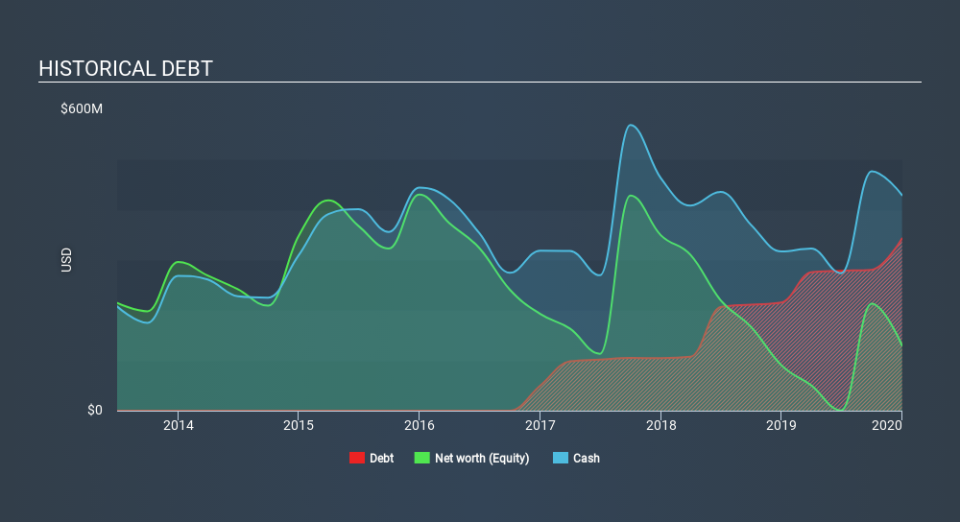Is Portola Pharmaceuticals (NASDAQ:PTLA) Using Debt Sensibly?

Howard Marks put it nicely when he said that, rather than worrying about share price volatility, 'The possibility of permanent loss is the risk I worry about... and every practical investor I know worries about. So it seems the smart money knows that debt - which is usually involved in bankruptcies - is a very important factor, when you assess how risky a company is. Importantly, Portola Pharmaceuticals, Inc. (NASDAQ:PTLA) does carry debt. But is this debt a concern to shareholders?
When Is Debt A Problem?
Debt is a tool to help businesses grow, but if a business is incapable of paying off its lenders, then it exists at their mercy. In the worst case scenario, a company can go bankrupt if it cannot pay its creditors. However, a more frequent (but still costly) occurrence is where a company must issue shares at bargain-basement prices, permanently diluting shareholders, just to shore up its balance sheet. Of course, the upside of debt is that it often represents cheap capital, especially when it replaces dilution in a company with the ability to reinvest at high rates of return. The first step when considering a company's debt levels is to consider its cash and debt together.
View our latest analysis for Portola Pharmaceuticals
What Is Portola Pharmaceuticals's Net Debt?
The image below, which you can click on for greater detail, shows that at December 2019 Portola Pharmaceuticals had debt of US$343.1m, up from US$215.4m in one year. However, its balance sheet shows it holds US$429.3m in cash, so it actually has US$86.2m net cash.
A Look At Portola Pharmaceuticals's Liabilities
Zooming in on the latest balance sheet data, we can see that Portola Pharmaceuticals had liabilities of US$102.4m due within 12 months and liabilities of US$346.2m due beyond that. On the other hand, it had cash of US$429.3m and US$17.3m worth of receivables due within a year. So these liquid assets roughly match the total liabilities.
Having regard to Portola Pharmaceuticals's size, it seems that its liquid assets are well balanced with its total liabilities. So it's very unlikely that the US$1.40b company is short on cash, but still worth keeping an eye on the balance sheet. Despite its noteworthy liabilities, Portola Pharmaceuticals boasts net cash, so it's fair to say it does not have a heavy debt load! When analysing debt levels, the balance sheet is the obvious place to start. But ultimately the future profitability of the business will decide if Portola Pharmaceuticals can strengthen its balance sheet over time. So if you're focused on the future you can check out this free report showing analyst profit forecasts.
In the last year Portola Pharmaceuticals wasn't profitable at an EBIT level, but managed to grow its revenue by 191%, to US$117m. So its pretty obvious shareholders are hoping for more growth!
So How Risky Is Portola Pharmaceuticals?
Statistically speaking companies that lose money are riskier than those that make money. And in the last year Portola Pharmaceuticals had negative earnings before interest and tax (EBIT), truth be told. Indeed, in that time it burnt through US$239m of cash and made a loss of US$291m. However, it has net cash of US$86.2m, so it has a bit of time before it will need more capital. Importantly, Portola Pharmaceuticals's revenue growth is hot to trot. While unprofitable companies can be risky, they can also grow hard and fast in those pre-profit years. There's no doubt that we learn most about debt from the balance sheet. However, not all investment risk resides within the balance sheet - far from it. Case in point: We've spotted 3 warning signs for Portola Pharmaceuticals you should be aware of.
Of course, if you're the type of investor who prefers buying stocks without the burden of debt, then don't hesitate to discover our exclusive list of net cash growth stocks, today.
If you spot an error that warrants correction, please contact the editor at editorial-team@simplywallst.com. This article by Simply Wall St is general in nature. It does not constitute a recommendation to buy or sell any stock, and does not take account of your objectives, or your financial situation. Simply Wall St has no position in the stocks mentioned.
We aim to bring you long-term focused research analysis driven by fundamental data. Note that our analysis may not factor in the latest price-sensitive company announcements or qualitative material. Thank you for reading.

